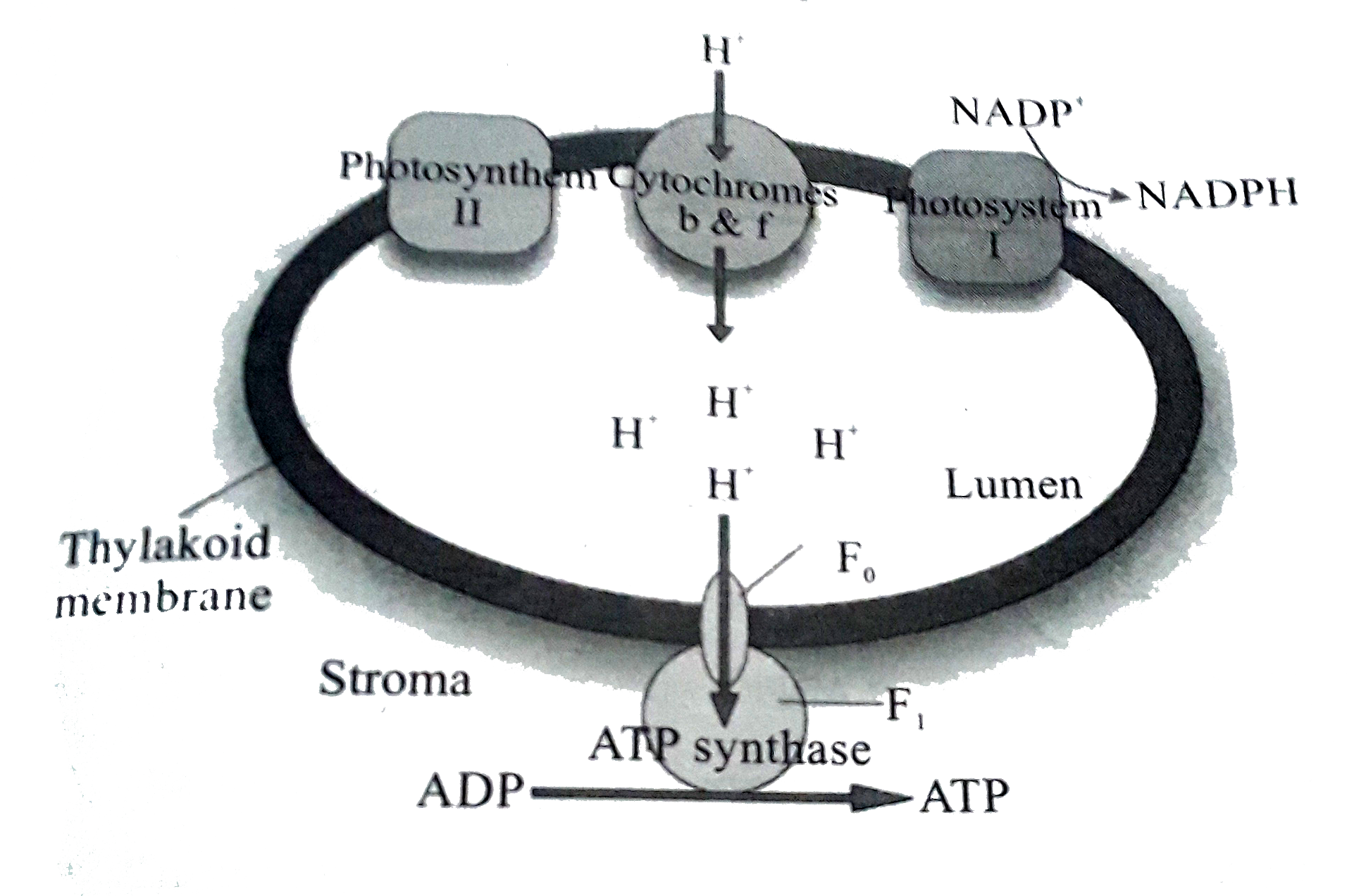Facilitated diffusion
Needs a carrier protein
Is an active process
Occurs against the concentration gradient
Needs ATP
The correct Answer is:A
Step by step video, text & image solution for Facilitated diffusion by Biology experts to help you in doubts & scoring excellent marks in Class 12 exams.
Similar Questions
Observe the given figure of ATP sysnthesis through chemiosmosis and arrange the followign events in correct sequence

(a) Movement of e− through H-carrier ltBrgt (b) Shifting of protons from stroma to Lumen ltBrgt (c) Facilitated diffusion of protons across the membrane
(d) Conformation change in the F1 particle of the ATPase
(e) Formation of ATP moleculeView SolutionTransport in plants || osmosis || types OF osmosis || endosmosis and exosmosis || types OF solution || isotonic hypotonic and hypertonic || osmotic pressure || significance OF osmosis || active transport comparison OF simple diffusion, facilitated diffusion and active transport
View Solution
Knowledge Check
- Question 1 - Select One
Read the assertion and reason carfully to mark the correct option in question.
Assertion: Facilitated diffusion and active transport show characteristics of being highly selective, they are liable to saturat, respond to inhibitors and are under hormonal regulation.
Reason: Membrane proteins are reponsible for both facilitated diffusion and active transport.AIf both assertion and reason are true and the reason is the correct explanation of the assertion.BIf both assertion and reason are true but reason is not the correct explanation of the assertion.CIf assertion is true but reason is false.DIf both assertion and reason are false. - Question 2 - Select One
How many statements about diffusion is /are false ?
(i) The diffusion rate depends on the size of the substrate.
(ii) Diffusion across the membrane depends upon its solubility in lipids.
(iii) Membrane protein provides sites for a hydrophilic substance to cross the membrane.
(iv) Facilitated diffusion is carried out by Proteins .A0B1C2D3 - Question 3 - Select One
Read the following statements and choose the correct ones---(A) Diffusion is a slow process and is dependent on a living system. (B) Diffusion of substances with hydrophilic moiety is facilitated by membrane proteins. (C) Facilitated diffusion causes net transport of molecules from a low to a high concerdration. (D) Saturations may be achieved in both facilitated dffusion as well as active transport .
A(A) & (B)B(B) & (D)C(A) & (C)D(B) & (C)
Find out A,B,C,D,E,F and G indicating either "yes" or "no" in the given table.
PropertySimple DiffusionFacilitated DiffusionActive Transport(i) Highly selectiveNoAB(ii) Transport saturatesCDYes(iii) Requires ATP EFGView SolutionHow many of the given statements are true?
A. The dry surface of the skin and the moist surface of the buccal cavity, are lined by compound epithelium.
B. Cuboidal epithelium facilitates diffusion across the epithelium.
C. Intercalated discs are the cell junctions between the cardiac muscle cells.
D. Skeletal muscle fibers can be located in the biceps muscle.
E. In a bone, osteocytes are located in lacunae.View SolutionAssertion :- Usually facilitated diffusion is carried out of those substances in which hydrophilic moiety is present
Reason:- Lipoidal nature of plasma membrane creates difficulty in passing of those substances in which hydrophilic moiety is present.View SolutionRead of the following four statements (A-D):
(A) Submucosa contains nerves, blood vessels and lymph vessels.
(B) AlcohoI is absorbed in the stomach
( C) Veiy significant digestive activity occurs in small intestine.
(D) Fructose is absorbed by facilitated diffusion. How many of the above statements are correctView SolutionAssertion: ATPase enzyme has two parts, One called the F1 is embedded in the membrane of thylakoid and forms a transmembrane channel that carries out facilitated diffusion of proton across the membrane.
Reason: The other portion is called F0 and protrudes on the thylakoid membrane on the side that faces the stromaView Solution

